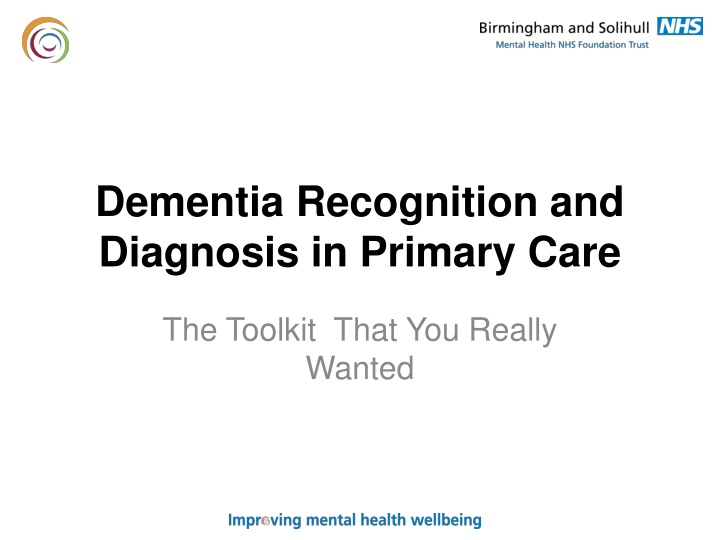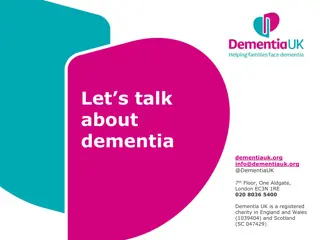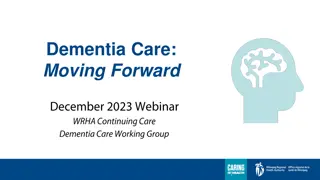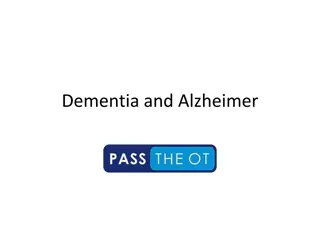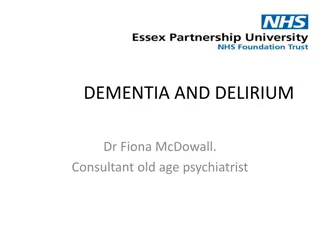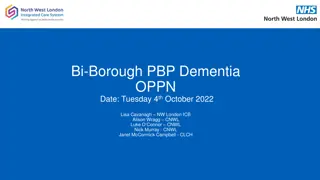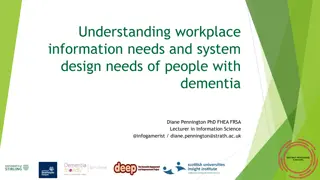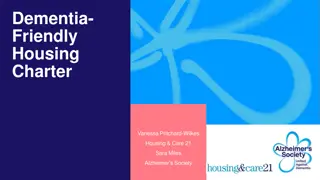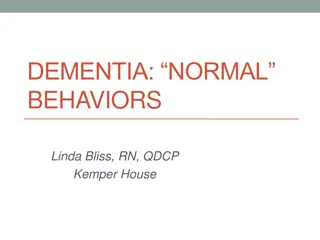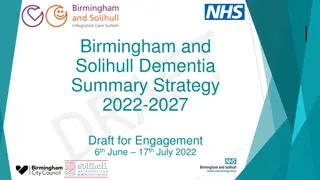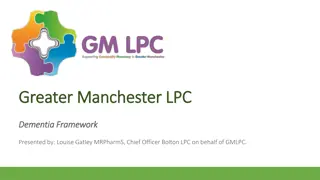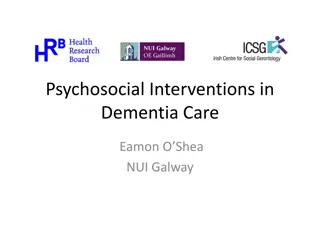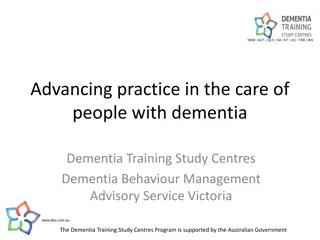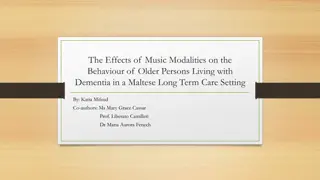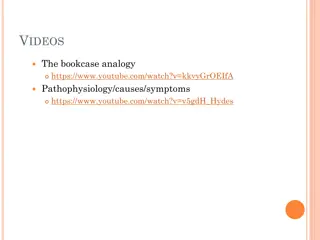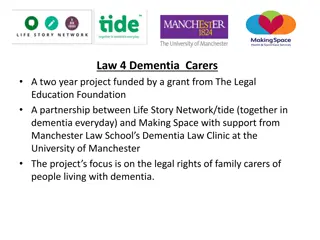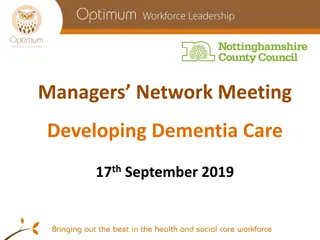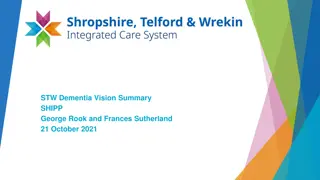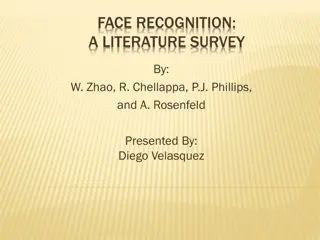Dementia Recognition and Diagnosis in Primary Care Toolkit
This toolkit provides comprehensive information on dementia recognition and diagnosis in primary care settings. It covers the assessment process, clinical presentations, stages of diagnosis, and key questions for identifying cognitive decline. Images and descriptions enhance understanding of the toolkit's content, aiding healthcare professionals in recognizing and diagnosing dementia effectively.
Uploaded on Aug 09, 2024 | 2 Views
Download Presentation

Please find below an Image/Link to download the presentation.
The content on the website is provided AS IS for your information and personal use only. It may not be sold, licensed, or shared on other websites without obtaining consent from the author.If you encounter any issues during the download, it is possible that the publisher has removed the file from their server.
You are allowed to download the files provided on this website for personal or commercial use, subject to the condition that they are used lawfully. All files are the property of their respective owners.
The content on the website is provided AS IS for your information and personal use only. It may not be sold, licensed, or shared on other websites without obtaining consent from the author.
E N D
Presentation Transcript
Dementia Recognition and Diagnosis in Primary Care The Toolkit That You Really Wanted
Birmingham and Solihull Mental Health Foundation NHS Trust Dr Peter Bentham Memory Assessment Service (MAS)
Assessment Process Summary Determine whether there is a history of cognitive decline Determine whether there is a history of functional decline Determine whether there are any atypical dementia features Exclude mimic conditions Confirm cognitive impairment Diagnose or refer for diagnosis
What is Dementia? Decline in multiple areas of higher brain function Decline in functional independence Due to physical brain disease
Clinical Presentations Complaint of cognitive or functional decline from patient or informant Difficulty giving a history, or overt cognitive impairment at interview Report or evidence of behavioural change Decline in appearance or loss of weight New onset depression, anxiety or psychosis Decline in illness self-management skills
Diagnosis is a Simple 4 Stage Process 1. Determine whether there has been a decline in higher brain function 2. Determine whether there has been a decline in functional independence 3. Determine whether this is likely due to physical brain disease 4. Determine likely nature of brain disease
Has There Been a Decline in Higher Brain Function? Is there a history suggestive of decline in higher brain function? This is usually a decline in cognition but sometimes the change may be behavioural The patient can often describe this However it is always a good idea to confirm with an informant
Informant Questions for Cognitive Decline Does (P) have a problem with their memory? Does (P) ever have difficulty finding the right word? Does (P) ever seem disorientated or confused? How did the problem start? How long has this been present? Is it getting worse? Are things getting slowly worse or are there more sudden changes?
Has There Been a Decline in Functional Independence? This is an essential requirement for a dementia diagnosis The information is best obtained from an informant If there is no significant functional decline the descriptor is mild cognitive impairment More complex activities such as managing finances tend to be affected first
Informant Questions for Functional Decline Do the problems that you have told me about interfere with (P)s ability to manage in everyday life? Are there things that (P) is less good at now? Are there things that you need to help with? What about: driving, finances, shopping? Would you be happy to leave (P) to manage on their own for a couple of weeks? Are there any risks?
Informant Questions for Atypical Dementia Does (P) ever see things that are not there? Does (P) hit out whilst asleep? Does (P) seem vacant or sleepy during the day? Has (P) started to complain of a headache? Has (P) had any fits or seizures? Has (P) s behaviour changed significantly? Consider patient has any neurological abnormalities not explained by strokes (e.g. parkinsonism, urinary incontinence, gait apraxia)
Is Problem Likely to be Due to Physical Brain Disease? This is a clinical judgement based on what you know about the patient Ideally you would like to see an image of the brain to prove this However all you need to do is to sensibly exclude other things that can mimic dementia The presumption is then that a brain disease is the likely cause
Exclude the 3Ds! 1. Delirium 2. Depression (mental disorder) 3. Drugs (including alcohol)
Identifying the 3Ds 1. Is patient acutely physically ill? Has problem developed rapidly? Does patient appear confused or drowsy? 2. Does patient appear depressed? Does patient have a past history of severe mental illness? 3. Has patient recently started any medicines known to impair cognition? Is there any evidence of alcohol misuse?
Confirm Cognitive Impairment There is a history suggestive of cognitive and perhaps functional decline which you judge is likely to be due to physical brain disease You should now confirm that patient is actually cognitively impaired on a test We suggest using 6CIT or Mini-Cog Alternative brief tests are outlined in the appendix
6-Item Cognitive Impairment Test (6CIT) What year is it? Incorrect = 4 Question Score What month is it? Incorrect = 3 Remember this name and address John Smith 42 High Street Bedford. Please repeat it. About what time is it? Not scored Incorrect = 3 Count backwards from 20 to 1 1 error = 2 > 1 error = 4 1 error = 2 > 1 error = 4 1 error = 2 2 errors = 4 3 errors = 6 4 errors = 8 5 errors = 10 Say the months of the year in reverse What was the name and address I asked you to remember? 6CIT Score /28 (> 7 = abnormal)
Mini-Cog I want you to remember 3 words. Repeat them so I know you have heard me. Banana, Sunrise, Chair Draw a clock face and put the numbers in the right place. Set the hands to 10 past 5 What were the 3 words I asked you to remember?
Mini-Cog Scoring 3 recalled words Negative for cognitive impairment Negative for cognitive impairment Positive for cognitive impairment Positive for cognitive impairment 1-2 recalled words + normal CDT 1-2 recalled words + abnormal CDT 0 recalled words
Blood Tests FBC ESR or CRP U+E / Ca LFT (GGT) TFT HbA1C / Blood sugar B12 / Folate
Likely Dementia: What to do Next You now have a history suggestive of cognitive decline and possibly functional decline You think this is likely due to brain disease Patient has performed below expectation on your preferred cognitive test Should you make the diagnosis? If not then where to refer?
Simple Case - GP Diagnosis Older person (> 80 years) Clear progressive decline in cognition Clear progressive decline in function Decline duration longer than 12 months Clear abnormal performance on cognitive test Not likely to be dementia mimic (3D s) No atypical dementia features GP can safely diagnose dementia
GP Diagnosis Subtype Slow onset, gradual progression, initial or main symptom impaired memory Sudden onset in relation to stroke, worse in steps related to further strokes Mixture of above Diagnosis Dementia due to Alzheimer s disease (EU00) Diagnosis Vascular Dementia (EU01) Diagnosis Mixed Dementia (EU002)
Complex Case - Refer to MAS Younger person (<75) Uncertain dementia including MCI Possible mental illness mimic Atypical dementia Apparent dementia in those who do not speak good English Apparent dementia in those with possible learning disability
Risky Case - Refer to Neurology / Medicine New conspicuous headache!! Rapid onset dementia (< 3 months)!! Recent onset seizures / myoclonus!! Focal neurological signs not likely due to stroke disease!! Possible delirium!!
MAS Referrals Inform patient /carer of the referral Provide clear informant contact details State main problem and duration of decline Enclose computerised medical history Enclose details of current medication Enclose recent blood results Tell us if an interpreter is needed
Potential Benefits of MAS Referral Timely accurate diagnosis Useful information on prognosis Functional assessment including safety and RDAC Reversal of remediable causes Treatment with anti-dementia drugs Access to clinical genetics Treatment with appropriate non-pharmacological therapies Participation in clinical trials Information on affairs management Access to support services and benefits Dementia Advisors Admiral Nurses
Remember Diagnosing dementia is easy Just 4 questions to answer! 1. Has there been a decline in some aspect of higher brain functioning? 2. Has there been a decline in functionality? 3. Is this most likely due to brain disease? 4. What is the likely nature of brain disease? Simple case - GP diagnosis Complex case specialist diagnosis
Appendix Brief Cognitive Tests
Brief Cognitive Tests Assess a limited range of functions Quick to administer Compare performance to Mr or Mrs Average Cut offs are available They are not Dementia Tests and should simply be used to confirm cognitive impairment Do not use them as screening tests
Free to Use Cognitive Tests 6CIT (www.patient.co.uk/doctor/six-item-cognitive-impairment-test- 6cit) Mini-Cog (http://geriatrics.uthscsa.edu/tools/MINICog.pdf) GPCOG (www.gpcog.com.au) MOCA (www.mocatest.org) M-ACE (www.neura.edu.au/frontier/research/test-downloads/) AMT (www.patient.co.uk/doctor/Abbreviated-Mental-Test-(AMT).htm)
Which Test to Use? General purpose 6CIT, Mini-Cog, GP- Cog High IQ, Atypical presentation MOCA, M-ACE More severely impaired, Nursing home AMT Visually impaired 6CIT, AMT
DIY Testing Put 3-5 common objects on your desk Ask patient to name and remember them Put them out of sight Ask patient to draw large clock face, put all the numbers in and set hands to 10 past 5 Ask patient to recall the objects Make your own judgement on whether normal for patient s background
Geriatric Depression Scale (GDS) Question Yes No Score Are you basically satisfied with your life? 0 1 Do you feel that your life is empty? 1 0 Are you afraid that something bad is going to happen to you? 1 0 Do you feel happy most of the time? 0 1 Total > 1 = Depressed
